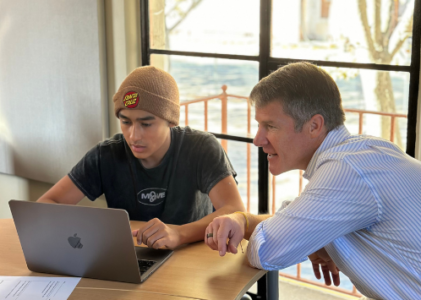A moment – twenty-two 10th graders, gathered shoulder-to-shoulder around a table in the Bancroft Archives at UC Berkeley. Animated conversation as students pick-up student papers written by undergraduates from 1968 analyzing student protests at the University, peruse anti-War posters from the Vietnam War, and make sense of sign-up cards for people interested in joining the Free Speech Movement. “It’s so interesting to see the links between Freedom Summer in Mississippi and the Free Speech Movement,” remarks one student, something that no one had actually mentioned to the students but that had immediately jumped out at them as they looked at the primary sources.
Another moment – three students enthusiastically discuss the argument they are putting together for Oral Arguments. “Is there a Supreme Court case that would provide a precedent for us here?” Students precede to “name drop” a series of Supreme Court cases – Tinker v Des Moines, Davis v Monroe County Board of Education, Healy v James, Cox v New Hampshire. “What works best here?” they wonder.
A third moment – “Doesn’t it seem just a bit ironic that Elon Musk is arguing that he is defending free speech while effectively silencing the Global Alliance for Responsible Media by bringing a lawsuit they can’t possibly afford to fight?” wonders a student aloud. Many heads nod around the classroom. “Of course,” someone else notes, “This isn’t really a First Amendment case because it doesn’t involve the government.” More heads nod. “Is there anything that can be done?” someone else wonders aloud. Hmmm.
The first few weeks of the school year, I have had the opportunity to jump back into the classroom, co-teaching a 10th grade Immersive course – “Our Voices, Our Rights: Sports, Pop Culture, & Campus Protest.” Immersives, three-week, interdisciplinary, transcripted courses that start and end the year for our Upper School students, are an opportunity for students to extend their learning outside the classroom and engage deeply with academic content that is rigorous and relevant. For this course, we have had a remarkable array of experiences:
- A visit to the Ninth Circuit Court of Appeals in San Francisco, where we heard oral arguments on three cases and then met with the judges and their clerks for a Q&A
- An in-person visit at UCBerkeley with Dean Erwin Chemerinsky, one of the preeminent constitutional scholars in the country
- Tours of the Victory Salute statue at San Jose State University and of Levi’s Stadium to talk about the role of free speech in sports
- visits to the archives at both San Jose State University and UC Berkeley to explore primary sources from the 1960s
- conversations with the Executive Directors of the UC National Center for Free Speech and the Freedom Forum, with David French, a leading conservative columnist and free speech lawyer from the New York Times, with Scott Silver, a senior executive at YouTube, and with Sal Pizarro, local Mercury News columnist
The agenda was inspiring and challenging, and it pushed students to grapple with complex contemporary questions – how should universities manage campus protest amidst the most turbulent campus period since the 1960s? What, if any, restrictions should exist on social media platforms and who makes those decisions? What’s the right way as a society to manage hate speech? What role should athletes play in social justice movements?
The students finished the three-weeks with more questions than answers (as did I!), the right type of result, I think, as it is the reminder that meaningful and engaging work does not have simple answers. As colleges and employers have been bemoaning for years, schools do a good job of graduating test takers and task completers, skills that are increasingly irrelevant in a world where critical thinking, problem solving, and resilience are the real differentiators for successful adults. The Immersives, like so much of our program across our JK-12 school, offers an alternative – academically rigorous, deeply engaging, and focused on the skills – critical thinking, problem solving, collaboration – that our students will need to succeed in a rapidly changing world and to prepare for jobs that in many cases do not yet exist.
A final moment – a student steps in front of the table prepared to deliver the closing remarks for her team, the final remarks for the 30-minute Oral Arguments. She pauses and takes a deep breath, exuding confidence in front of the two judges and the more than 40 people in the room (despite what undoubtedly is going on inside her head and heart!), and then begins. Over the next three minutes, she beautifully summarizes her team’s arguments, drives home their case, and does it with the poise of a seasoned lawyer. At the end, everyone in the room is briefly silent, and then the room breaks into applause. I have goosebumps as I soak up this moment for her and her peers.
I have spent my career dedicated to the idea that our job as educators is to create opportunities for students where we, as educators, lay the foundation and then step back – allowing the students to take center stage and shine. Whether that’s in front of an audience of 40+ people, as was the case with these trials, or whether it’s in any number of other authentic learning experiences that push students to do more than they can imagine possible, the best educational experiences always start with the assumption that students can do amazing things when we hold them capable and then provide the right level of supports along the way.
Over these last three weeks, we had high expectations for our students, and they not only met those expectations but, in many cases, far exceeded them. What a joy and a privilege it has been to be part of that experience.

